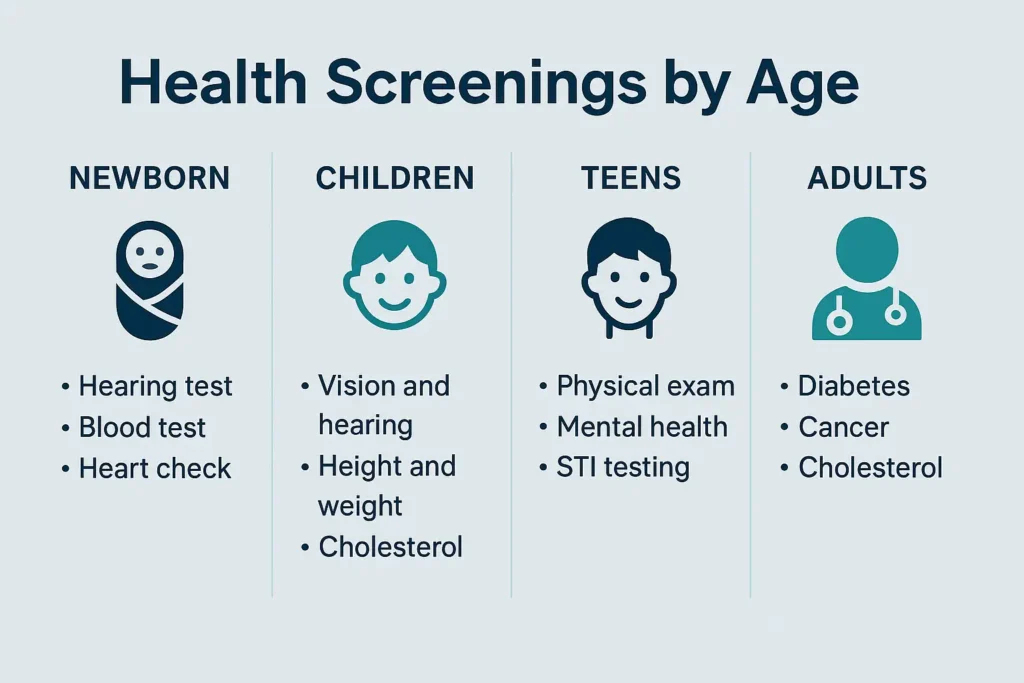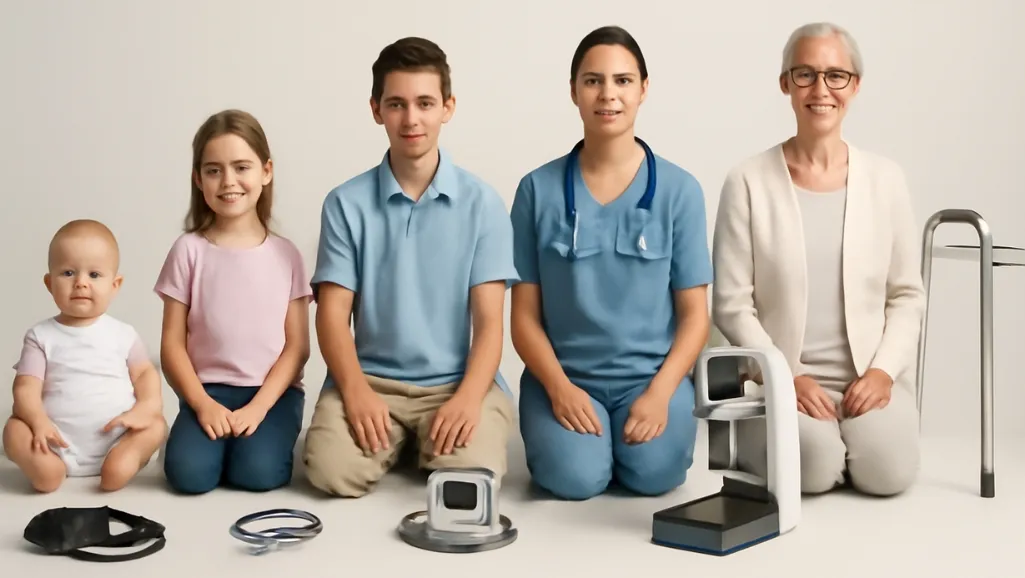Key Takeaways
- Health screenings by age help catch diseases early, even before symptoms show.
- Regular health screening can reduce the risk of serious illnesses like cancer, diabetes, and heart disease.
- Different health screenings by age are needed because our body changes as we grow older.
- Long-term health is supported by scheduling the appropriate test at the appropriate time.
- Don’t wait for symptoms, early health screening means early treatment.
What is a health screening?
A health screening is a test or check-up done to find health problems early. It looks for warning signs before you even feel sick. Most of the time, these tests are simple. They may involve checking your blood, measuring your blood pressure, or even doing a scan.
Doctors use health screening to find problems like diabetes, heart disease, or some types of cancer before they get worse. These assessments are conducted during routine checkups or as per your physician’s recommendations.
Doing health screenings by age means you’ll know what tests are right for your current stage of life. That way, you don’t miss anything important.
Why are health screenings important for healthcare?
You might literally save your life with a good health screening strategy. These tests help doctors catch health problems early, before they turn serious. Still wondering why they’re important? Here’s why:
- Health screenings by age help track your health as your body changes over time.
- Early problem detection enables faster, more efficient treatment.
- Many early detection tests can stop diseases before symptoms even start.
- Following age-specific health tests gives you clarity on what to focus on each decade.
- Screening helps prevent emergencies by identifying silent health risks like high blood pressure.
- They save money by avoiding costly treatments for late-stage illnesses.
- Regular health monitoring enhances long-term quality of life and provides peace of mind.
- Preventing one health issue now can stop several future complications.
- Preventive screenings lead to healthier aging and stronger independence in later years.
- When you know your health status, you can make smarter lifestyle choices.

Newborn health screenings
Right after birth, babies go through a few important tests. These early health screenings by age are done before the baby even leaves the hospital. Here’s what’s usually included:
- Hearing test
- Blood test to check for rare genetic conditions
- Heart check (for any major issues)
These preventive screenings help doctors catch problems early, even if the baby looks healthy. Treating them early can avoid bigger issues later on.
Vaccinations also start at this stage, following the immunizations schedule.
Health screenings for children
Children must have their growth monitored on a regular basis. Doctors look for problems with sight, hearing, and development.
During checkups, the doctor might:
- Test vision and hearing
- Measure height, weight, and head size
- Check blood pressure
- Do a cholesterol test if there’s family history
- Keep vaccinations up-to-date
These health checkups by age group help spot things like speech delays or growth concerns. Pediatricians often adjust the screening plan based on your child’s needs.
Health screenings for teens
Teenagers go through many physical and emotional changes. That’s why doctors focus not just on physical health, but also mental health and risky behaviors.
Here’s what health screenings by age often include for teens:
- Regular physical exams
- Blood pressure check
- Depression and anxiety screenings
- Sexual health counseling
- Vaccines like HPV, meningitis
Doctors may also ask questions about drugs, alcohol, and stress. If there is a family history, certain clinics could suggest early detection tests for genetic illnesses.
Health screenings for young adults
This stage includes people in their 20s and 30s. At this age, you might feel healthy, but screenings are still important.
Young adults often need:
- Blood pressure check every year
- Cholesterol test every 4–6 years
- Diabetes screening if overweight or family history
- STI testing if sexually active
- Skin checks for unusual moles
- Breast/testicular self-exams
- Wellness assessments to monitor your overall health
Also, sticking to the immunizations schedule is crucial, this includes flu shots and Tdap boosters.
These routine health monitoring steps help you stay on track without feeling overwhelmed.
Health screenings for mid-life adults
Your 40s and 50s are when health screenings by age become more detailed. You’re more likely to develop long-term issues, so doctors recommend more tests.
Important tests during this age:
- Annual blood pressure check
- Regular diabetes screening
- Thyroid tests
- Cancer screenings (mammogram, colonoscopy, prostate)
- Eye exams for glaucoma
- Bone density test (if high risk)
- Heart health tests including EKG if needed
Women should start mammograms around age 40–50. Men might start prostate screening in this range, depending on family history.
These are all part of recommended screenings for this age group.
Health screenings for older adults
People over 60 need more frequent and detailed tests. The body slows down, and risks go up. Regular health screenings by age help manage these changes.
Tests often include:
- Annual diabetes screening
- Vision and hearing tests
- Cancer screenings (colonoscopy, mammogram, PSA)
- Cholesterol test more often
- Bone density scan for osteoporosis
- Fall risk assessment
- Memory and cognitive checks
- Check for signs of depression
Vaccines like shingles and pneumonia are also part of the immunizations schedule at this stage.
These tests help with routine health monitoring and reduce the chances of hospital stays.
Takeaways
No matter how old you are, there’s a right time for every health screening.
By following health screenings by age, you make sure your body gets the care it needs, when it needs it.
Most screenings are quick, easy, and painless. They don’t take long, but they make a big difference.
Don’t wait until something feels wrong. Plan your medical tests by age, and give yourself the best chance for a long, healthy life.
FAQs
What is an important screening test for adults aged 50 and over?
A colonoscopy is a crucial health screening after 50 to detect colon cancer early. Mammograms and bone scans are also part of recommended screenings for older adults.
What health screenings should I get in my 20s and 30s?
Routine wellness exams, cholesterol test, blood pressure check, and STI tests help detect early risks. These health screenings by age are simple but highly effective in early detection.
At what age should I start getting regular cancer screenings?
Start most cancer screenings like mammograms and colonoscopies around age 40–50. Those with family history may begin earlier, as part of medical tests by age guidelines.
How often should I get a full body check-up?
Get wellness exams once a year. These include routine health monitoring like weight, vitals, and lab tests to spot early changes in health before problems become serious.
What screenings are important after age 50?
After 50, important tests include cancer screenings, diabetes screening, cholesterol test, and bone density scan. These health screenings by age help reduce age-related complications.
Why are age-specific health screenings important?
Age-specific health tests ensure your screenings match your health risks. They make your care targeted and efficient, supporting better outcomes with fewer unnecessary procedures or delays.
Do men and women need different health screenings?
Yes. Women need pap smears and mammograms. Men may need prostate exams. Both should follow health checkups by age group that include heart, blood sugar, and vision tests.
Are there recommended screenings for mental health by age?
Yes. Teens and adults benefit from mental health assessments. They are part of preventive screenings to catch depression, anxiety, or stress early and support better emotional well-being.
When should I start screening for osteoporosis?
Women should start by 65; men around 70. High-risk people may start earlier. It’s a part of routine health monitoring to prevent fractures and support stronger bones.
Is a cholesterol test necessary if I’m under 40?
Yes, a cholesterol test is vital even under 40, especially with family history or obesity. It helps spot risks for heart disease early through health screenings by age planning.
What vaccinations should adults get by age?
The immunizations schedule includes flu shots yearly, shingles at 50+, pneumonia at 65+, and Tdap every 10 years. These vaccines are part of routine health screening care.
















Leave a Comment